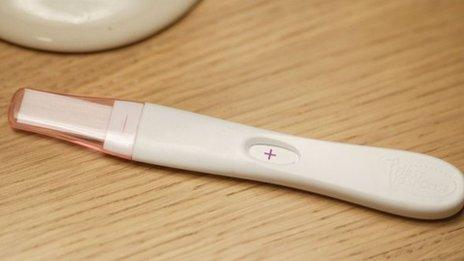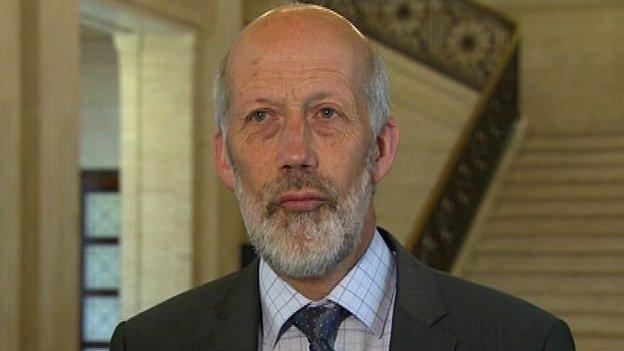NI abortion law 'incompatible' with human rights
- Published

The current law on abortion in Northern Ireland is "incompatible" with human rights law, a High Court judge has declared.
However, he said allowing abortions for victims of sexual crime and cases of fatal foetal abnormality under the present law would be a step too far.
The judge's decision does not change the law or strike it down - rather it puts the onus on politicians to come up with new abortion legislation.
It will now be a matter for Stormont.
Divisions
Unlike the rest of the UK, abortion is only permitted in Northern Ireland if a woman's life is at risk or there is a permanent or serious risk to her mental or physical health.
BBC News NI reporter David Maxwell said: "There is no obligation on Stormont MLAs to act on the ruling, and deep divisions on this issue mean consensus will be difficult to reach at a political level.
The case was heard in the High Court
"The Northern Ireland Assembly is also unlikely to take the matter forward while there is the prospect of an appeal by the attorney general or the Department of Justice.
"From now, there is a six-week deadline in which to lodge an appeal."
'Not unexpected'
Stormont Justice Minister David Ford said the judge's decision "was not unexpected, and we now need time to consider the next steps".
Last month, the same judge, Mr Justice Horner, said women who were the victims of sexual crime and cases of fatal foetal abnormality (FFA) were entitled to exemptions in the law.
He said that the current provisions in the Offences Against the Person Act 1861 breached Article 8 of the European Convention on Human Rights.
This requires respect for a person's family life and personal autonomy.
The matter will be raised at the Northern Ireland Executive on Thursday, a day after the ruling, but a decision on the way ahead is not expected to come out of that meeting.
In short, any change to abortion law in Northern Ireland is still some way off.
The legal challenge against the abortion legislation was brought by the Northern Ireland Human Rights Commission (NIHRC).
'Reflect'
In a statement after Wednesday's ruling, NIHRC's chief commissioner Les Allamby, said: "We welcome the court's decision today to grant a declaration of incompatibility, confirming that the existing termination of pregnancy laws are contrary to human rights.
"It now falls to the Department [of Justice] and the Northern Ireland Executive to bring forward legislation to reflect the judgement of the court.
"The commission will await to see how the department and the executive will take this forward or if any appeals will be lodged."
Mr Ford said he had already sought agreement among Northern Ireland Executive colleagues to bring forward draft legislation to exempt cases of fatal foetal abnormality.
"I also said in response to the consultation on abortion law carried out earlier this year, that the complexities of legislating in respect of sexual crime were such that it was not possible to make detailed proposals at that time but that the department would consider further," he said.
"It remains my view that legislating in this regard will present very difficult challenges."
- Published16 December 2015

- Published30 November 2015

- Published3 June 2015

- Published16 April 2015

- Published9 October 2013
